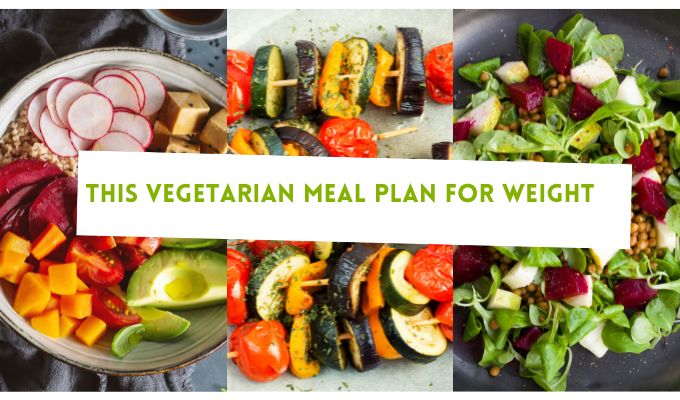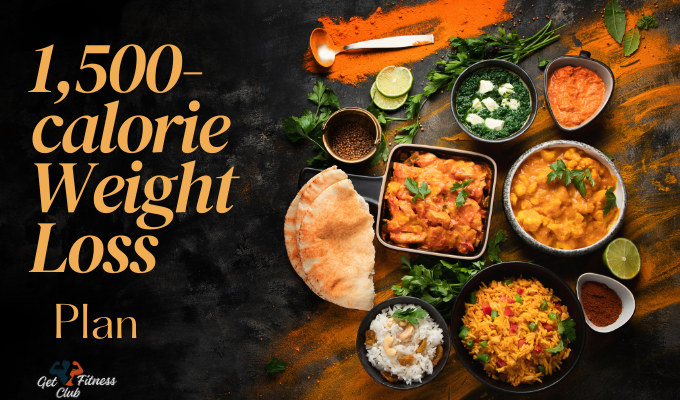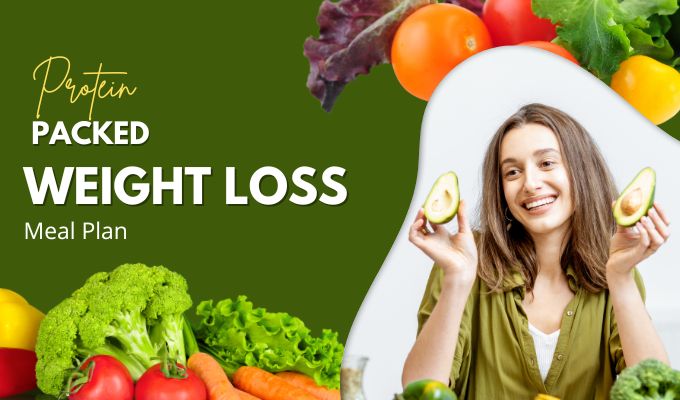Embarking on a journey to a healthier you? Look no further! Dive into the world of wellness with our comprehensive guide on the This Vegetarian Meal Plan for Weight. This isn’t just another diet – it’s a sustainable lifestyle change designed to make achieving your weight goals both delicious and nourishing. Picture a plate filled with vibrant veggies, hearty grains, and plant-powered proteins, all working together to support your well-being. Say goodbye to calorie counting and hello to a satisfying, flavorful approach that not only helps shed those extra pounds but also boosts your overall health. Let’s make your wellness journey both enjoyable and achievable!
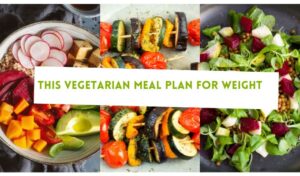
Vegetarian Meal Plan for a Healthy Weight:
Maintaining a healthy weight is crucial for overall well-being, and adopting a vegetarian meal plan can be a nutritious and satisfying approach. Here’s a week-long guide to help you plan your meals for optimal health.
How to Meal Prep Your Week of Meals:
Before diving into the daily meal breakdown, it’s essential to spend some time on meal preparation. Consider the
following tips:
Plan Ahead: Outline your meals for the week, including breakfast, snacks, lunch, and dinner. Make a shopping list to ensure you have everything you need.
Batch Cooking: Prepare large quantities of staple ingredients such as grains, beans, and vegetables. This will make assembling meals throughout the week more convenient.
Portion Control: Use smaller containers to portion out your meals and snacks. This helps prevent overeating and ensures you have balanced meals.
Variety is Key: Include a diverse range of fruits, vegetables, whole grains, and plant-based proteins to ensure you get a broad spectrum of nutrients.

Now, let’s explore the day-to-day breakdown of your vegetarian meal plan:
Day 1:
Breakfast (310 calories): Scrambled tofu with spinach and cherry tomatoes.
A.M. Snack (95 calories): Handful of mixed berries.
Lunch (345 calories): Quinoa salad with chickpeas, cucumber, and feta cheese.
P.M. Snack (80 calories): Carrot and cucumber sticks with hummus.
Dinner (394 calories): Lentil and vegetable stir-fry with brown rice.
Day 2:
Breakfast (211 calories): Greek yogurt with sliced peaches and a sprinkle of chia seeds.
A.M. Snack (116 calories): Apple slices with almond butter.
Lunch (360 calories): Sweet potato and black bean wrap with avocado.
P.M. Snack (174 calories): Trail mix with nuts and dried fruits.
Dinner (422 calories): Eggplant and mushroom whole wheat pasta.
Day 3:
Breakfast (271 calories): Oatmeal topped with berries and a drizzle of honey.
A.M. Snack (78 calories): Orange slices.
Lunch (360 calories): Quinoa-stuffed bell peppers with a side of mixed greens.
P.M. Snack (32 calories): Celery sticks with peanut butter.
Dinner (380 calories): Chickpea curry with brown rice.
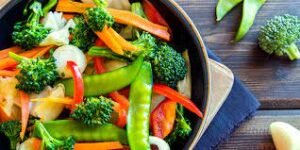
Day 4:
Breakfast (271 calories): Whole grain toast with avocado and cherry tomatoes.
A.M. Snack (78 calories): Banana.
Lunch (360 calories): Spinach and feta omelette.
P.M. Snack (35 calories): Sugar snap peas.
Dinner (405 calories): Cauliflower and broccoli stir-fry with quinoa.
Evening Snack (174 calories): Dark chocolate square.
Day 5:
Breakfast (306 calories): Berry smoothie with almond milk and a scoop of protein powder.
A.M. Snack (32 calories): Sliced cucumber.
Lunch (360 calories): Mediterranean couscous salad with olives and cherry tomatoes.
P.M. Snack (95 calories): Rice cakes with hummus.
Dinner (428 calories): Grilled portobello mushrooms with polenta.
Day 6:
Breakfast (310 calories): Avocado and spinach smoothie.
P.M. Snack (95 calories): Mixed fruit salad.
Lunch (345 calories): Lentil soup with a side of whole grain bread.
P.M. Snack (174 calories): Edamame beans.
Dinner (360 calories): Quinoa and vegetable stir-fry.
Day 7:
Breakfast (322 calories): Chia seed pudding with mixed berries.
A.M. Snack (95 calories): Pineapple chunks.
Lunch (345 calories): Caprese salad with balsamic vinaigrette.
P.M. Snack (78 calories): Almonds.
Dinner (401 calories): Zucchini noodles with tomato and basil sauce.

Conclusion:
In conclusion, adopting a This Vegetarian Meal Plan for Weight offers a balanced and sustainable approach to nutrition. The week-long guide emphasizes diverse, plant-based meals rich in essential nutrients. With practical tips like meal prepping and portion control, this lifestyle not only supports weight management but also aligns with environmental and ethical considerations. Tailor the plan to your preferences, listen to your body, and enjoy the journey towards a healthier, plant-powered you. Cheers to a fulfilling and nourishing lifestyle!
FAQS:
Q1: What vegetarian foods are good for weight gain?
To gain weight on a vegetarian diet, focus on calorie-dense and nutrient-rich foods. Include items like nuts, seeds, avocados, tofu, legumes, whole grains, and healthy oils. Incorporating larger portions and frequent snacks can help increase your calorie intake.
Q2: How to lose 5kg in a week vegetarian?
Losing 5kg in a week is not recommended due to potential health risks. Instead, aim for gradual and sustainable weight loss. Focus on a balanced vegetarian diet with plenty of fruits, vegetables, whole grains, and lean proteins. Incorporate regular exercise, stay hydrated, and get adequate sleep for a healthy approach to weight loss.
Q3: How to lose 5kg in 7 days diet plan?
Attempting to lose 5kg in 7 days may lead to muscle loss and nutritional deficiencies. A safer approach is to create a calorie deficit through a balanced diet and exercise. Include more vegetables, fruits, whole grains, and lean proteins in your diet. Avoid sugary and processed foods, and engage in regular physical activity.
Q4: Which vegetarian food is best for weight loss?
For weight loss on a vegetarian diet, focus on foods with high fiber content and low-calorie density. Incorporate fruits, vegetables, whole grains, legumes, and plant-based proteins. Limit the intake of refined carbohydrates and processed foods. Also, pay attention to portion sizes and stay consistent with regular exercise.
